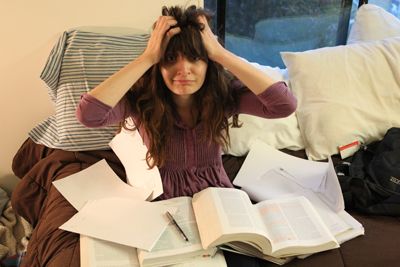 With final exams looming on the horizon, students are scrambling to finish up semester projects and end the semester with good grades — all while balancing different aspects of their lives. With so much to do and so little time, some students may decide to pull an all-nighter to accomplish everything they have been putting off. However, research shows that staying up all night has negative effects on the body.
With final exams looming on the horizon, students are scrambling to finish up semester projects and end the semester with good grades — all while balancing different aspects of their lives. With so much to do and so little time, some students may decide to pull an all-nighter to accomplish everything they have been putting off. However, research shows that staying up all night has negative effects on the body.
In the process of trying to stay awake all night and day, students may resort to drinking unhealthy amounts of caffeine or energy drinks, eating unhealthy fatty foods or taking prescription and illicit drugs. “I drink coffee and tea throughout the night to stay awake,” freshman Hazel Marie Alim said. Initially, caffeine can temporarily increase one’s ability to concentrate and focus, but consuming too much caffeine can have the opposite effect. It can cause one to become unfocused, anxious, hyper and jittery.
Staying up all night has both long and short-term effects. Long-term dangers are a reduced learning ability and an increased likelihood of anxiety disorders. Additional hazards include weight gain, increased risk of diabetes and potential brain damage.
Forty-six percent of Pepperdine students surveyed by the Student Health Center (SHC) said that sleepiness is a problem. Mood changes such as depression and anxiety can be brought about by a lack of sleep. Sleep deprivation affects concentration, memory and the immune system. In addition, those suffering from a lack of sleep have difficulties with decision-making, an increased likelihood of accidents and increased feelings of fatigue and stress.
 If sacrificing sleep is a must, it is best to fuel your body with the right balance of protein and carbohydrates. Some healthy snack choices are peanut butter and crackers, cheese and fruit, and energy bars and milk. These healthy choices will provide energy for the short term and help to maintain that energy and prevent a “crash.” Also, taking short 10 to 15 minute naps can be very beneficial. Research has shown that power naps increase alertness, improve mood and prevent burnout among other things. But, if a nap is too long, it can leave feelings of drowsiness.
If sacrificing sleep is a must, it is best to fuel your body with the right balance of protein and carbohydrates. Some healthy snack choices are peanut butter and crackers, cheese and fruit, and energy bars and milk. These healthy choices will provide energy for the short term and help to maintain that energy and prevent a “crash.” Also, taking short 10 to 15 minute naps can be very beneficial. Research has shown that power naps increase alertness, improve mood and prevent burnout among other things. But, if a nap is too long, it can leave feelings of drowsiness.
Pulling an all-nighter affects everyone differently. Those who get eight to nine hours of sleep a night and eat nutritious meals, exercise regularly and maintain a low stress level will be better able to cope with insults to the body than someone who does not.
Jennifer Ehteshami, certified physician assistant at the SHC, said the majority of complaints and concerns that people come to the SHC for are related to a lack of sleep in some way. Examples are the flu, colds, headaches, chest pain, abdominal pain, fatigue and fainting.
“Even if lack of sleep did not directly cause the symptoms, it could exacerbate them by decreasing the immune system, affecting the person’s mood and ability to concentrate or by increasing a person’s stress level,” Ehteshami said.
Instead of pulling an all-nighter, remember research has shown that those who get eight to nine hours of sleep and are well rested do better on exams. “A rested mind and body is the best preparation you can do for your upcoming tests and assignments,” Ehteshami said. It is critical to fuel the body with nutritious foods, adequate sleep and exercise and maintain a low stress level in order to function at your best.
